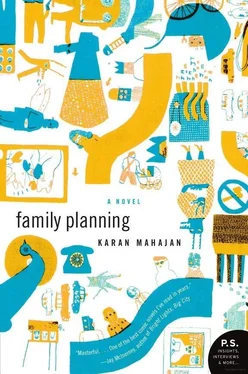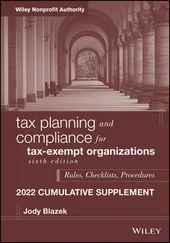Arjun had never held a crying girl before — not one of this age. She lay in a zigzag of limbs across Anurag’s and Arjun’s laps in the car, weeping, dripping snot. Arjun shushed and soothed her like she was a baby.
Ravi, in the front, kept talking. “Shit, we’re finished. Shit. I can’t tell my dad. He’ll kill me. I don’t want to go to jail. Shit.”
“Shut up, man,” said Arjun. “You have to call him. She’s crying. We’ll worry later.” He looked at the girl. “Are you okay?”
“You okay, sweety?” Anurag asked.
“Sweety? Shut up, Anu.”
CHAPTER 14. DIWAAN-E-KHAAS
MR. AHUJA STOOD in the Super Prime Minister’s drawing room — still hot and smoky from a religious ceremony — and carefully studied Rupa Bhalla’s body language as she signaled him into an uncomfortable cane chair with a swish of her saffron dupatta. She was shaped like one of those rolled mattresses you saw people resting on at railway stations — highly unstable, giving, when she walked, the general impression of being pushed — and she sat down on a maroon chair with a palpable sense of relief. Then, without pause, she commanded him to drink a lassi, asked him what type of lassi he liked, shouted for the servant, said she knew he liked namkeen from the wedding they’d been to — what did Rakesh think, had she planned the wedding well? — but right now the type of lassi escaped her, it was namkeen, was it not?
Rakesh was immediately on guard. He told her the wedding was corrupt, ostentatious, theatrical.
She laughed and said, “Thank you.”
Still, she was being formal, distant. She’d not once asked him about his family — as was her habit — and now she was pretending to forget what type of lassi he liked.
This was absurd. The whole country knew he drank kesar.
“I’d like namkeen, yes, you’re right,” demurred Rakesh. “So, ji, I’ve come to explain my letter—”
Rupa looked relieved. “I’m so glad,” she said, slapping her forehead theatrically. “I thought you had also come to resign!”
He protested, “Rupa-ji, but I am already resigned. I came to talk about that only.”
“ Resigned? ” she said, practically sneezing the word. “Oh yes! Quite right.” She tapped her head. “Rohini told me there was an e-mail from you. How was I to know it was a resignation? If she had told me, I would have seen first thing, baba. But e-mail otherwise is just e-mail. These days even I am getting so much spam. Do you know how to get rid of this spam?”
Her mouth a nest of baby sparrows, her voice was that of a schoolgirl. Her large red bindi — that all-knowing dot — had today been replaced by an oily tilak. She leaned across the table for a silver napkin holder, pushing in the yellow triangular fins of paper so they didn’t crackle in the fan blast. She talked to people as if their faces were the receivers on a phone apparatus, keeping you so close that you could smell the soft ticking of supari in her mouth, her wicked smile dripping from the corners of her lips like a retired comedian’s, eyes nosed so far apart you couldn’t look her in both at once.
Rakesh was grateful for the table separating them.
“You said you thought I had come to resign also , ji,” he said, crossing his legs and rocking the shell of the white cane chair around him. “Who else has resigned?”
“Well,” said Rupa, snaking her head from side to side. “A wonderful question! A timely one!”
“Yes?”
“Everyone in our dear party! Except you,” she said, clapping her hands for the servant.
“But, ji — that is what I am saying — I am resigned also!”
They had a hearty laugh about this.
“Quite right, quite right,” said Rupa, looking distractedly at the door to the kitchen. “Krishan! Bring saahb the lassi! Hen-ji. Sorry. Why are you resigning again?”
“Beg pardon? Find them ? Find whom?”
“Eh?”
“Eh?”
This misunderstanding afforded a five-second cliffhanger of silence. Both Rupa and Rakesh sat up erect. Rakesh was still coming to terms with the news of this mass resignation and, worse, with the fact that Rupa’s state of agitation wasn’t simply a result of his visit. To be a minister, after all, was to be the center of a universe frothy with favors and flattery — everywhere you turned were Black Cat Guards, lackeys, peons, CEOs, special interests, undercover journalists — but with Rakesh the feeling of centrality had become particularly acute, nerve-wracking. Indeed, since last night the universe seemed to have telescoped down to a point in his head; a third marble of sadness rolled behind his eyes. Everywhere he looked were signs of his own impending doom — signs he’d first noticed when he and Arjun drove out at twelve at night on Arjun’s sixteenth birthday, Rakesh in the driver’s seat, Arjun beside him, their Toyota Qualis flying through the carbon-dioxide exhaling green belt of Delhi past the convoyed trucks and the shivering beggars to the first grand site of a flyover, a piece of cordoned road filled simply with Roman-looking columns of concrete and jutting steel, and between the columns coal-faced men carrying bucket after bucket of stone to dump into the foundational pit, a huge chugging grinder behind the men belching gray fumes against the black night, and then rain, rain outlining the shape of the city with its sound, father and son sitting in the car ten feet away, Rakesh trying to tell Arjun, Always think of the little people behind the grand things , why was this his message of choice? How had he mistakenly imagined this was Arjun’s seventeenth birthday? But what he really wanted to say was, Think of me, I love you , and then Arjun had opened the window and diagonal after diagonal of rain came splashing into their laps, and Rakesh knew: Arjun wasn’t listening. Arjun was a child in an adult world. Arjun didn’t care for his father’s political or philosophical tracts; they only had the instinctive bond that parent and child shared.
So Rakesh had no choice but to keep everything at arm’s length to protect his son, to take the world by its axis and stab it into his own heart. And when Arjun had walked in on him last night, he’d given up the one secret besides Rashmi he’d managed to keep.
The world’s axis turned another notch into his chest. The pressure in his sinuses was immense.
“My resignation of course is a different subject—” sniffed Rakesh.
“Of course your resignation is different!” said Rupa, embargoing a yawn with her hand. “That’s because you are educated and from a good family and all that, and you wouldn’t resign over something so foolish. You know, none of these menfolk who are so happily resigning today have even watched the show. If you ask me: very stupid, it is. Firstly, no one would care if a virtuous woman on TV died, isn’t it? Maybe Tulsi, but no one else. You know how this sexism-vexism is. Secondly, what makes me more angry, actually, is that all these women are asking that he be brought back! Otherwise, there will be a strike today! All over India! The three and a half cheeks of it!”
A show ? Rakesh thought. A TV show?
The three and a half cheeks of it?
“Did you know,” Rupa continued, “that the resignation letters I have in my possession at the present moment were written by the wives of our good MPs and ministers? What is wrong with these menfolk, tell me? And because their wives — not them — have written the letters, they are all saying, if you don’t make Mohan Bedi return to the show, we will seek your resignation! Imagine! Super Prime Minister isn’t even a real post, and they want to kill it.”
Читать дальше












